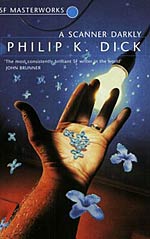
![]() Sable Aradia
Sable Aradia
5/24/2017
![]()
Read for the 12 Awards in 12 Months and the Science Fiction Masterworks Challenge. This book won the 1978 British Science Fiction Association Award.
This is my third PKD book, and I have to say at this point, I think he's a great writer, but I'm not a fan. His stuff is gloomy, his characters are unlikable, and you can pretty much guarantee it's going to be an unhappy ending.
This is, however, the first book of his where I question its placement among the SF Masterworks. This is a story about a drug addict who descends into burnout, and it draws heavily upon Dick's own experience with drugs, which he makes clear in his Author's Note at the end. I have seen this movie before. I would suggest that perhaps it was included on the list because maybe it was a pioneer of such stories? But that's not the case. Aleister Crowley's Diary of a Drug Fiend precedes A Scanner Darkly by a good 55 years. Is this another case of critics only choosing to read "literary" works and thus, by limiting what they'll deign to read, missing the fact that this is not at all original?
Not only this, but the story is only nominally science fiction in the first place. The sci-fi elements are: the plant that is the source of the drug in question, to my knowledge does not exist; Vice cops who investigate the drug scene must live in immersion in the drug culture and conceal their identity with "scramble suits" when dealing with even one another; and the drug, Substance D, does a particular type of brain damage that causes a disconnection between left and right halves of the brain.
This is based on an old (and later discredited) theory of psychology. Normally I don't have any trouble with obsolete tech in vintage sci-fi; I chalk it up to alternate history and let it go. But when it's based in psychology, which is not recognized as a science, it's particularly jarring.
Perhaps it's viewed in the field as one of the predecessors to cyberpunk, and maybe that's why it's included.
However, it is an extremely well-written book, and it points out a lot of things that maybe people never think about in our society, from how the poor must be satisfied with McDonald's over mountains and nobody seems to have a problem with this, to how our perception of reality is never quite the same as the fact of reality--and what is real, anyway? It's also an interesting meditation on the nature of the Self, and are we really who we think we are, and do we perhaps have multiple selves vying for equal attention and control?
I found reading this challenging, like dipping my hand into a bowl of maggots. I could make myself do it, but I sure didn't enjoy it. I think that this is another example of the tendency towards "grim for grim's sake" in literary writing. Grim does not make it more sophisticated and therefore "better."
Was it worth reading? Yeah, sure it was, especially if you're the type of person who looks down your nose at addicts, self-righteously convinced that they suffer because they are bad or lesser people with character flaws. If he does nothing else, Dick illustrates that it can happen to anyone, for any reason, at any time, and gives you a little empathy for such a struggle and the horrific consequences.
But I didn't like it. I'll be taking it back to the bookstore. And I probably won't read PKD again until he comes up on my SF Masterworks list. Just not my cup of tea.
http://dianemorrison.wordpress.com